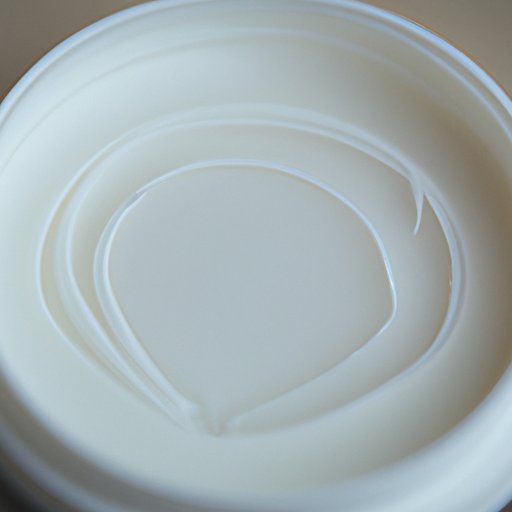
I. Introduction
When it comes to facial moisturizers, there are countless options available. But what about Vaseline? As a tried and true classic, many people wonder if this staple product can be used on the delicate skin of the face. In this article, we’ll explore the pros and cons of using Vaseline on your face, how to use it effectively, and alternative products to consider.
II. The Pros and Cons of Using Vaseline on Your Face
There are both benefits and risks associated with using Vaseline as a facial moisturizer. One of the primary benefits is that it is highly occlusive, meaning it forms a barrier on the skin that locks in moisture. This makes it a particularly effective option for those with dry or sensitive skin.
However, there are also potential drawbacks to using Vaseline on your face. For example, it can make oily skin feel even oilier, and it may clog pores, leading to breakouts. Additionally, there are some potential risks associated with exposure to certain chemicals found in petroleum jelly, although the available research on this topic is limited.
III. The Ultimate Guide to Using Vaseline as a Facial Moisturizer
If you decide to try using Vaseline as a facial moisturizer, there are some important tips to keep in mind. First and foremost, it’s essential to start with clean skin, so wash your face thoroughly before application. Then, simply apply a thin layer of Vaseline to your face and neck, being careful not to use too much.
It’s also important to consider timing. Many people find that using Vaseline at night, as the final step in their skincare routine, is most effective. This allows for maximum absorption and ensures that the product won’t interfere with makeup or other products during the day. However, it’s worth noting that this approach may not be ideal for those with acne-prone skin, since sleeping on your face can increase the risk of breakouts.
IV. Why Vaseline May Not Be the Best Option for Your Skincare Routine
While Vaseline can be a great option for some, it’s important to recognize that it may not be the best fit for everyone. For example, if you have particularly oily skin, using Vaseline as a daily moisturizer may make matters worse. Additionally, those with acne-prone skin may need to be cautious, as using a highly occlusive product like Vaseline can increase the risk of breakouts.
Furthermore, many people prefer to avoid products that contain petroleum-derived ingredients, like Vaseline. If this is a concern for you, there are alternative products to consider that use plant-based ingredients instead.
V. The Truth About Whether or Not You Can Use Vaseline on Your Face
Ultimately, the question of whether or not Vaseline is safe to use on your face is a complicated one. While some studies have suggested that certain chemicals found in petroleum jelly may be harmful, there is no clear consensus on this issue. However, Vaseline itself is generally considered safe when used as directed, and many people have used it on their face with no adverse effects.
That said, it’s always a good idea to do a patch test before using any new product on your face, just to be safe. Apply a small amount of Vaseline to a patch of skin on the inside of your arm, and wait at least 24 hours to see if there is any reaction.
VI. The Dos and Don’ts of Using Vaseline on Your Delicate Facial Skin
If you do decide to use Vaseline on your face, there are some important dos and don’ts to keep in mind. For example, do make sure you’re starting with clean skin, and do use a thin layer of the product. Don’t use too much, or apply it to areas of your face that are prone to breakouts.
It’s also important to note that Vaseline should never be used as a replacement for sunscreen. While it can help lock in moisture, it offers no UV protection whatsoever.
VII. Alternative Skincare Products to Consider Instead of Vaseline for Your Face
If you’re not sold on using Vaseline on your face, there are plenty of alternative skincare products to consider. Some popular options include fragrance-free lotions, facial oils, and natural balms and salves. Look for products that use all-natural ingredients, like coconut oil, shea butter, and vitamin E.
VIII. Conclusion
Vaseline can be an effective, affordable option for facial moisturizing, but it’s not for everyone. If you’re interested in using it, be sure to consider your skin type and take the necessary precautions to avoid clogging pores or exacerbating existing skin issues.
Regardless of whether or not you decide to use Vaseline on your face, the most important thing is to prioritize your skin’s health and hydration. By taking a thoughtful, informed approach to skincare, you can help keep your skin looking and feeling its best.




